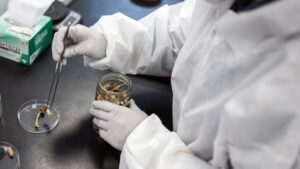Understanding Psilocybin Clinical Trials: What They Mean for Mental Health Treatment
- January 29, 2024
- 12:15 am

Notable Elements
Revival of Psilocybin Research: Psilocybin, once a sidelined psychedelic compound, is now at the forefront of mental health research, offering new hope in treating various mental health disorders.
Clinical Trials Explained: Psilocybin clinical trials involve rigorous testing phases to evaluate safety, efficacy, and optimal dosages for treating mental health conditions like depression, anxiety, and PTSD.
Breakthrough in Depression Treatment: Significant research indicates that psilocybin therapy can rapidly and effectively reduce symptoms of depression, often with lasting results.
Anxiety Relief in Life-Threatening Illnesses: Psilocybin shows promise in reducing anxiety and depression in patients with life-threatening cancer, enhancing their quality of life.
Mechanism of Action: Psilocybin acts on serotonin receptors, altering consciousness and disrupting the Default Mode Network in the brain, helping break patterns of negative thinking.
Psychedelic-Assisted Psychotherapy: Psilocybin treatment combines the drug experience with psychotherapy, ensuring a holistic approach to mental health treatment.
Safety and Side Effects: Psilocybin has a low potential for abuse and toxicity, with transient anxiety and confusion as common side effects during the psychedelic experience.
Potential Game-Changer in Psychiatry: With ongoing positive results, psilocybin could revolutionize psychiatric care, especially for those unresponsive to traditional therapies.
Legal and Regulatory Hurdles: Despite its therapeutic potential, psilocybin’s status as a Schedule I substance poses significant challenges to research and medical use.
Ethical and Social Considerations: The research resurgence brings ethical questions about equitable access and the need to address the stigma associated with psychedelic substances.
Towards Personalized Medicine: Psilocybin trials are exploring personalized treatment approaches, aiming to maximize therapeutic benefits for individual patients.
Global Research Efforts: The interest in psilocybin trials is global, with diverse research environments contributing to a more comprehensive understanding of its benefits and risks.
Educational Imperative: Educating the public and medical professionals about psilocybin is crucial to dispel misconceptions and prepare for its potential integration into mental health treatment.
Future of Mental Health Treatment: Psilocybin trials represent a shift towards more compassionate, comprehensive, and innovative mental health care, showing immense promise for those battling mental health issues.
Introduction
In recent years, the resurgence of research into psychedelic substances has revolutionized the field of mental health. At the forefront of this psychedelic renaissance is psilocybin, the active compound in “magic mushrooms,” which has shown significant promise in clinical trials. This blog post delves into the world of psilocybin clinical trials, exploring their implications for mental health treatment and how they could change the landscape of psychiatric care.
The Resurgence of Psilocybin Research
Psilocybin was first isolated and synthesized in the 1950s by Swiss chemist Albert Hofmann. However, its clinical research was halted in the 1970s due to legal restrictions. Fast forward to the 21st century, and we’re witnessing a renewed interest in its therapeutic potential, particularly for treating various mental health disorders.
What are Psilocybin Clinical Trials?
Clinical trials are research studies performed on humans to evaluate the efficacy and safety of a medical strategy, treatment, or device. In the context of psilocybin, these trials are designed to test its effects on various mental health conditions, including depression, anxiety, and post-traumatic stress disorder (PTSD).

The Process of Clinical Trials
Psilocybin clinical trials typically progress through phases:
Phase 1: Tests the safety of psilocybin, determining the appropriate dosage and identifying any potential side effects.
Phase 2: Focuses on the efficacy of psilocybin, exploring how well it works in treating a specific condition.
Phase 3: Involves larger groups of participants, further assessing effectiveness and monitoring adverse reactions.
Psilocybin and Depression
One of the most significant areas of psilocybin research is its use in treating depression. A landmark study published in the journal ‘Nature Medicine’ in 2020 revealed that psilocybin therapy could significantly reduce depression symptoms. The trial demonstrated that even a single dose of psilocybin, combined with psychological support, could produce substantial and rapid antidepressant effects.
Psilocybin and Anxiety
Trials have also explored psilocybin’s impact on anxiety, particularly in patients with life-threatening cancer diagnoses. Results indicate that psilocybin therapy can lead to substantial decreases in depression and anxiety in this demographic, often with long-lasting effects.
The Mechanism Behind Psilocybin’s Effects
Psilocybin works by activating serotonin receptors in the brain, particularly the 5-HT2A receptor. This activation leads to altered consciousness, which can manifest in visual and auditory changes and profound shifts in mood and perception. More importantly, psilocybin appears to disrupt the Default Mode Network (DMN) in the brain, which is overactive in people with depression. This disruption allows patients to break free from the rigid patterns of negative thinking and rumination often associated with mental health disorders.
The Role of Therapy in Psilocybin Treatment
It’s crucial to understand that psilocybin treatment in clinical settings is not just about the drug. It’s a holistic approach, where the psychedelic experience is supported by psychotherapy. This combination is often referred to as ‘psychedelic-assisted psychotherapy.’ Before a psilocybin session, therapists prepare participants for the experience, and following the session, they help them integrate their experiences into their daily lives.
The Safety and Side Effects
The safety profile of psilocybin is another reason for its growing acceptance. Research indicates that it has a low potential for abuse and a low risk of toxicity. Common side effects include transient anxiety and confusion during the psychedelic experience, but serious adverse events are rare.

The Future of Psilocybin in Mental Health Treatment
As research progresses, psilocybin could become a game-changer in the field of psychiatry. It offers a potential treatment for those who have not responded to traditional therapies. However, it’s important to remember that psilocybin is not a ‘one-size-fits-all’ solution and should be used within the appropriate clinical framework.
Legal and Regulatory Challenges
Despite promising results, psilocybin remains a Schedule I substance under the Controlled Substances Act in the United States, indicating a high potential for abuse and no accepted medical use. This classification is a significant barrier to research and therapeutic use. However, the ongoing positive results from clinical trials are paving the way for potential reclassification and medical legalization.
Navigating the Ethical and Social Implications
The resurgence of interest in psilocybin also brings ethical and social considerations to the forefront. There is a growing discourse on ensuring equitable access to psilocybin therapy once it becomes available, given the high costs associated with clinical trials and potential treatments. Moreover, there is a need to address the stigma surrounding psychedelic substances, which has historically been a barrier to both research and acceptance in mainstream medicine.
Personalized Medicine and Psilocybin
An exciting aspect of psilocybin clinical trials is the potential for personalized medicine. As with many mental health treatments, responses to psilocybin can vary greatly between individuals. Ongoing research aims to identify which patients are most likely to benefit from psilocybin therapy, considering factors like genetic predispositions, the nature of their condition, and their previous experiences with mental health treatments. This personalized approach could lead to more effective and targeted therapies, maximizing benefits while minimizing risks.
The Global Perspective on Psilocybin Trials
While much of the research on psilocybin is happening in the United States and Europe, there is a growing interest worldwide. Different countries are approaching psilocybin research with varying degrees of openness and regulatory frameworks. This global perspective is crucial as it allows for a diverse range of research environments and participant demographics, potentially uncovering more comprehensive and universal findings about psilocybin’s efficacy and safety.
Also Read : How Psilocybin Alters Brain Function
Educating the Public and Medical Community
As psilocybin moves closer to potential approval for medical use, educating both the public and the medical community becomes essential. Misinformation and outdated perceptions about psychedelics can hinder acceptance and accessibility. Thus, ongoing efforts are needed to educate people about the benefits, risks, and science behind psilocybin therapy. This education should also extend to healthcare professionals, who will play a critical role in administering and supporting psilocybin treatments.
Final Thoughts
The journey of psilocybin from a naturally occurring psychedelic compound to a potential cornerstone in mental health treatment is a testament to the evolving nature of medical science and our understanding of the human mind. The clinical trials of psilocybin are not just about exploring a new treatment option; they represent a broader shift in how we perceive and address mental health disorders. As we continue to uncover the mysteries of psilocybin and its impact on the brain, we open new doors to healing and well-being for individuals who have long struggled with mental health issues. The promise shown by psilocybin clinical trials is a beacon of hope, signaling a future where comprehensive, compassionate, and innovative treatments are the norm in mental health care.

Hi! I’m Jacob Hawthorne, a passionate medical student dedicated to exploring the fascinating world of psychedelics, particularly magic mushrooms (commonly known as shrooms). With a deep interest in their therapeutic potential and profound effects on the human mind, I aim to provide accurate and evidence-based information about shrooms in the Canadian context.
